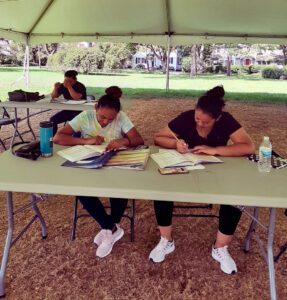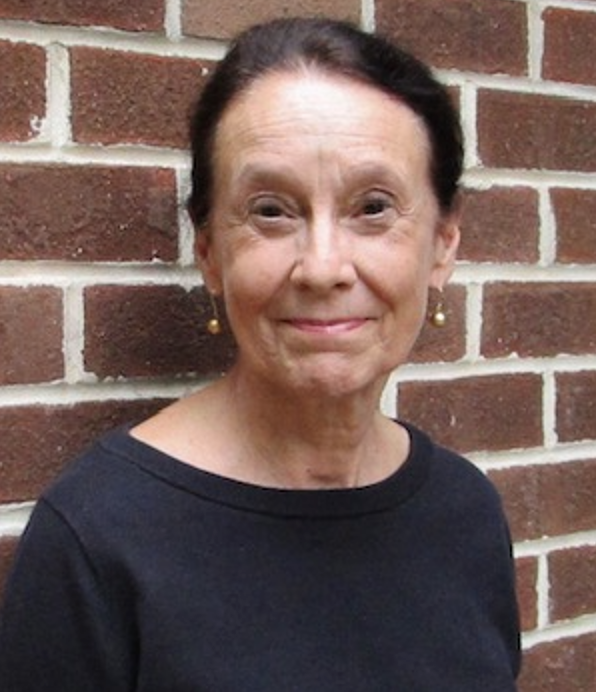 You study a foreign language in high school or college. Then you go to a country where that language is spoken and discover that it is hard for you to carry on a sustained conversation. Does this situation sound familiar? Or perhaps you end up in a country where you do not know the language at all. In the United States, English as a Second Language (ESL) courses provide an opportunity for people to overcome these obstacles or to enhance their language skills.
You study a foreign language in high school or college. Then you go to a country where that language is spoken and discover that it is hard for you to carry on a sustained conversation. Does this situation sound familiar? Or perhaps you end up in a country where you do not know the language at all. In the United States, English as a Second Language (ESL) courses provide an opportunity for people to overcome these obstacles or to enhance their language skills.
At the beginning of ESL courses at the Princeton Adult School, intermediate and advanced students are asked to state their goals for the class. One of the most common responses is: to become more comfortable communicating in English, or to have more confidence speaking in English. Some students have more specific goals: to be able to speak with a brother-in-law who doesn’t speak Korean, to be able to help their children with their homework and to talk to their children’s teachers, or to be able to give clear presentations in English at conferences.
According to the US Census Bureau’s Home Language Survey, about 35% of the population of Princeton are non-native speakers of English. The percentage of foreign-born residents is about 28%. (Estimates for 2019.) The reasons for coming here vary widely. There are professors, students and post-docs at the university; and there are people working in the pharmaceutical industry. There are software engineers, physicists, bakers, and construction workers. There are visiting researchers. There are au pairs, spending a year taking care of children and experiencing a new culture before finishing their studies. Many have settled here because of job opportunities. Some state that they are here for the freedom and peace it offers them and their families. For more detail about the international make-up of the Princeton area, read Living the American Dream Right Here in Princeton in this issue.
Of course, many of the non-native speakers in the Princeton area are highly proficient in English. But others take the opportunity to improve their language skills. Some ESL students are spouses, partners, or parents of people who have moved here for work or study. Others are in the workforce. They range in age from 18 to 80-something. Some of these ESL students have never studied English before they arrive here.
 ESL classes are always taught in English, even those for beginners. Beginner classes start with the alphabet, the names of objects used in class, numbers from 1-20. Beginning students learn short dialogues in which they introduce themselves and ask and answer basic questions. ESL instructors are trained to work with learners from a variety of language and cultural backgrounds, and an ESL course in Princeton will often have students from six to eight different language backgrounds represented in a single class.
ESL classes are always taught in English, even those for beginners. Beginner classes start with the alphabet, the names of objects used in class, numbers from 1-20. Beginning students learn short dialogues in which they introduce themselves and ask and answer basic questions. ESL instructors are trained to work with learners from a variety of language and cultural backgrounds, and an ESL course in Princeton will often have students from six to eight different language backgrounds represented in a single class.
When choosing an ESL program, look for one with instructors certified in Teaching English to Speakers of Other Languages. Such instructors have training in applied linguistics, language-teaching methodology; and language acquisition. Some are native English speakers; others are highly proficient English speakers who grew up speaking a language other than English.
In an intermediate to advanced ESL class, the instructor might present common ways to make a recommendation, such as: “You should visit the art museum; You could go to the art museum; or How about going to the art museum?” Then students are asked to prepare a recommendation of a place to visit and tell why it is a good place to go. One student recommends visiting Lancaster, PA and staying overnight with an Amish farm family. He tells the class he did a homestay with his wife and children. The children helped feed the farm animals, and they all ate dinner at a long wooden table with the family (pre-pandemic).Thanks to this recommendation, the class got a short lesson about the Amish way of life, too.
Another communication exercise is to explain the steps in a process. Students have to present the steps in order: First, do X, then do Y. Students prepare an oral demonstration. They must give some specific pointers, such as “Be sure to …” One au pair from France demonstrates how to change a car tire. An Italian sculptor shows the class how to hang a picture on the wall.
After learning how to express dissatisfaction, students write a letter of complaint, explaining the problem and stating what they want done about it. This task elicits real problems. One problem involved an item that the student ordered but never received. The vendor sent a photo of the package on the doorstep, but the photo did not show the student’s doorstep. The package had been delivered to the wrong house.
In a beginner English class, students learn to fill out forms with their name, their address and phone number. They practice spelling their names out loud. They practice pronouncing numbers. They practice asking for and giving simple directions.
Person A: Where is the library?
Person B: It’s on the corner of Witherspoon and Wiggins Street.
Students learn the parts of the body. They practice short dialogues to help them when they or their children need medical attention.
Doctor: What’s wrong?
Parent: She has an earache.
Doctor: Anything else?
Parent: Yes, she has a fever, too.
 In ESL classes, we practice making small talk. What do you say when you are waiting in a long line and want to strike up a conversation with a stranger next to you? Try talking about the weather.
In ESL classes, we practice making small talk. What do you say when you are waiting in a long line and want to strike up a conversation with a stranger next to you? Try talking about the weather.
“It sure is hot today.”
“When is the rain going to stop?”
Or try talking about something the person is wearing or an object they have.
‘I like your sweater.”
Then students practice keeping the conversation going. Don’t just say thank you. Add something else.
Person A: I like your sweater.
Person B: Thank you. My sister made it for me for my birthday.
Then the first person has to think of something else to say to keep the conversation going.
Person A: I wish I could knit, or Oh, I wish I had a sister that could knit like that.
 Even now that the classes are online, students make friends in class. A Brazilian lawyer came here with her husband and two young children during the pandemic. She became friends with a Japanese classmate in the Zoom class. After her friend returned to Japan, the Brazilian student was able to update the class about their classmate. Of course, it will be joyful to be able to get together again for in-person classes. There is always an end-of-semester party at which students bring special dishes from their home countries. Many students report that one of the positive outcomes of taking an English course is the friends they make in the classes and the friends they make when they go out and strike up conversations.
Even now that the classes are online, students make friends in class. A Brazilian lawyer came here with her husband and two young children during the pandemic. She became friends with a Japanese classmate in the Zoom class. After her friend returned to Japan, the Brazilian student was able to update the class about their classmate. Of course, it will be joyful to be able to get together again for in-person classes. There is always an end-of-semester party at which students bring special dishes from their home countries. Many students report that one of the positive outcomes of taking an English course is the friends they make in the classes and the friends they make when they go out and strike up conversations.
Coming to live in a new place can be scary, especially if it involves getting used to a different culture. Getting a better grasp of the English language and making friends who are going through similar adjustments can help with the transition. If you or someone you know is looking to improve English skills or practice conversational English in a supportive setting, the following organizations offer ESL classes and ESL conversation groups in Princeton:
- The Princeton Adult School has ESL courses at four proficiency levels. At each level, there is a four-skills course and a conversation course. Courses are currently on Zoom on Monday, Tuesday and Thursday evenings. Scholarships are available. Enroll online at: Princeton Adult School ESL Courses
- The Princeton Public Library (PPL) currently offers online Conversation Groups led by volunteers in the afternoons and evenings. In-person conversation groups will resume Oct. 1, subject to change depending on the protocols in place at the time. The schedule of virtual groups is They are separated into Intermediate and Advanced proficiency levels. A beginner-level ESL course and a citizenship course are offered at the library, as well, but they are currently on hold due to the pandemic. PPL also has a variety of online language learning resources, which are free for those with a library card.
- The YWCA offers daytime and evening ESL courses at a range of proficiency levels. There are also workplace readiness and citizenship courses. Courses are currently online. Financial aid and scholarships are available. Conversation groups led by volunteers are available for enrolled students. Contact Judith Mason at 609-686-5026 for more information. YWCA of Princeton ESL Programs

Jean Yepes is on the Board of the Princeton Adult School (PAS), serving as the Coordinator of the ESL Program. She has been an ESL instructor at PAS since 2014.
